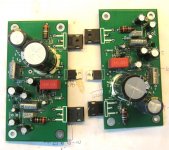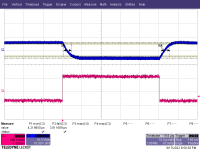All selected, including the topside IRF9610 (actually a 9510). Bottom side output fet is an IRFP9240, top side is an IRFP9140. We'll see how it all works out...
I went to Harbor Freight and got myself some largish plastic spring clamps to hold down the outputs on the heat sink, as the usual paper clamps don't work on the larger heat sink I'm using. So, far, it's no-va - I will need to track down possible stuffing or soldering errors, as the outputs don't bias up correctly (read, at all).
OK, I got one of the modules I had in house to bias up mostly properly.
This may require a largish film cap to couple the first stage to the voutput. That's OK, as I have some largish 15 uF PPS caps to do the duty... More on that later...
This may require a largish film cap to couple the first stage to the voutput. That's OK, as I have some largish 15 uF PPS caps to do the duty... More on that later...
A smallish 12V fan run at 9V appears sufficient to keep the smallish heat sinks I'm using at a reasonable temperature.
I got my 15uF PPS caps in place on the 2 boards. I'll try biasing them up again this weekend. I also located a suitable cap from Mouser, but it's polyester (maybe no so bad), and 3 bucks and change apiece in quantities I can stomach. I hate having to pay real money for stuff...
OK - I powered up one of the Half Nelson modules I had on hand, and gave it a treatment with a 10kHz square wave and a 7 ohm resistive load. The initial results are shown in the first pic. There is some overshoot. I tried successively larger caps across the 392k resistor from output to the gate of the J175 follower. The amount of capacitance required to clear up the overshoot was quite a bit larger than I suspected it might be, making me think that this might be a sheer drive issue rather than a matter of frequency compensation. This might make me consider changing around the drive to the jfet driving the IRFP240 bottom fet. Anyway, here are the pics. The first pic shows the output for the circuit as-is, without any "compensation". The rise and fall times are nice, but there is a considerable ammount of overshoot. It took about 100pf across the 392k resistor to clean this up, at the cost of a much slower rise time. I tried several values of resistor in series with the cap across the 392k, but the effect on the output square wave wave shape was less than satisfactory.
Attachments
Last edited:
I think I might try including a setup to provide more robust drive to the bottom side IRFP240, more voltage on the negative supply, and perhaps lower impedance on the resistive network from the output to the drive fet
OX, I'm trying to understand what made the original design successful and listenable, but attempts to "improve" the design are causing unexpected results. It's a relatively simple circuit, but the results from tinkering are something else....
I've got an alternate arrangement of the amp that gets rid of the negative supply and simplifies matters somewhat. I'll be monkeying around with it at work where my PSpice converges better,
New boards with the alternate circuit are winging their way to me (or crawling slowly, from my point of view). The circuit is similar to the 2nd revision of the design, with a little bias on the input p-mosfet to lift it up a trifle. Impedances around the jfet-mosfet Schade pair are also lowered. I'm using a PN4391 as the first stage in the Schade pair, maybe one of the nifty-doodle Linear Systems parts with higher gm and all that. I'll find out when I get around to selecting and characterizing the fets.
The boards have been delivered on Friday - at this point, I don't know where. I guess I'll find out on Monday. I hope it isn't a repeat of the previous mis-delivery.
Boards are almost populated - what I need to do next is to sit down and select a pair of PN4391s for the input of the Schade pair. Don't know whether I'll end up with generic 4391s or the fancy-pants Linear Systems variant with higher gm.
I'm putting together a power supply cap board that will go with this amp, incorporating Schottky rectifiers w/snubber and a Darlington cap multiplier to keep out the hmmmmmm.
DHL has decided that it's not their job any more to make deliveries during their ostensible customer's actual open hours, so I will be escalating this battle to a different front. This not only affects my delivery of Profusion lateral fets, but PCB deliveries for two of my projects.
- Home
- Amplifiers
- Pass Labs
- Half-Nelson Amp




